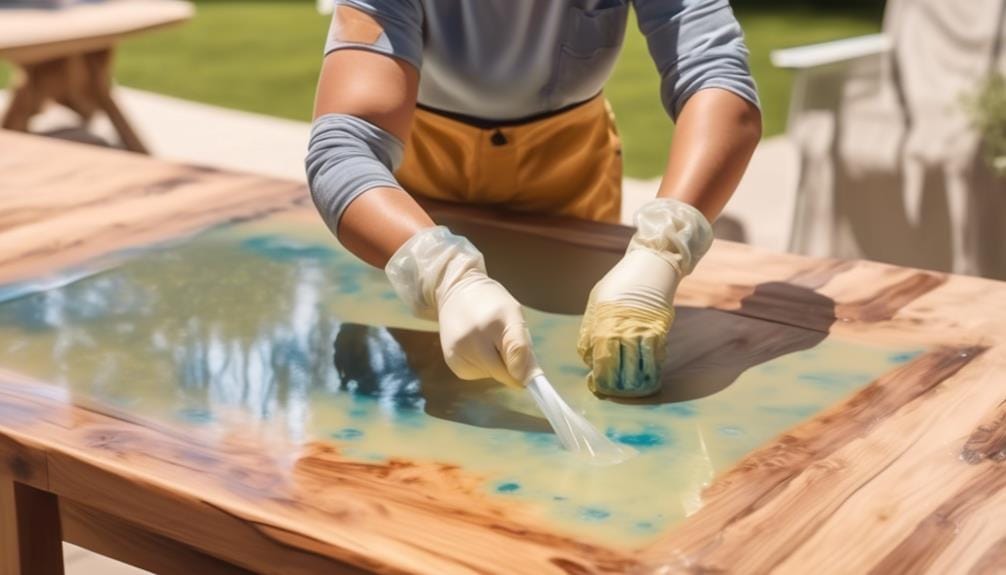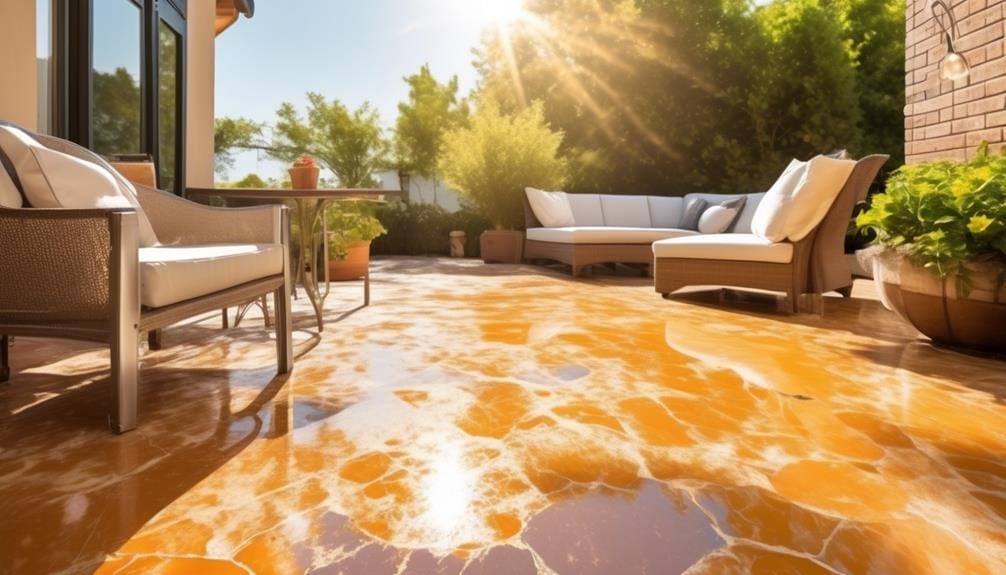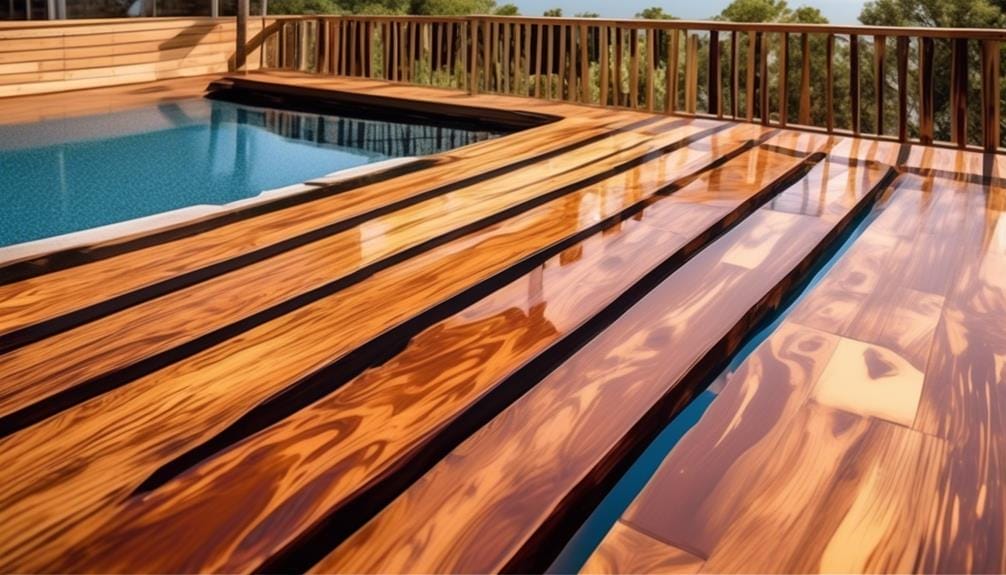Are you looking to protect and enhance your outdoor surfaces? Look no further than Epoxy Resin for Outdoor Use. This remarkable product offers a level of durability and protection that will leave you amazed.
But that’s not all; there’s so much more to discover about the benefits and applications of this versatile resin. So, whether you’re a homeowner looking to revamp your deck or a business owner seeking a long-lasting solution for your outdoor furniture, this discussion will provide you with valuable insights and expert advice.
Get ready to uncover the secrets of Epoxy Resin for Outdoor Use and take your outdoor spaces to a whole new level.
Key Takeaways
- Outdoor epoxy resin provides exceptional protection against harsh environmental conditions, extending the lifespan of marine surfaces and enhancing the appearance of boats and marine equipment.
- It offers excellent adhesion to fiberglass, wood, and metal surfaces, making it suitable for various outdoor applications such as marine surfaces, outdoor wood applications, outdoor furniture, decks and patios, and outdoor structures and fixtures.
- When using epoxy resin outdoors, it is important to properly prepare the surface, control the temperature during application and curing, choose epoxy resin with UV protection, and apply multiple thin layers for better adhesion.
- UV protection is crucial for outdoor epoxy resin surfaces, and options include using UV stabilizers (HALS), UV protection additives, marine-grade epoxy with UV resistance, or epoxy resin with UV protection additives. Additionally, proper maintenance, care, and safety precautions are necessary to preserve the beauty and durability of the surfaces.
Benefits of Epoxy Resin for Outdoor Surfaces
Epoxy resin offers a multitude of benefits for outdoor surfaces, making it an ideal choice for those seeking a strong, durable, and long-lasting coating. When used for outdoor use, epoxy resin provides exceptional protection against harsh environmental conditions, ensuring the longevity of the coated surface.
It’s particularly advantageous for marine applications, as it extends the lifespan of marine surfaces and enhances the appearance of boats and marine equipment. The resin’s resistance to UV rays prevents yellowing and degradation, reducing maintenance and repair costs while increasing the resale value of boats.
In addition, epoxy resin offers excellent adhesion to various surfaces, such as fiberglass, wood, and metal, providing protection against water, salt, and chemicals for applications both above and below the waterline. This high level of adhesion ensures that the coating remains intact even in harsh outdoor environments.
Moreover, the resin contains UV Additive (HALS), which slows degradation and reduces yellowing, maintaining its protective properties even in high moisture environments. With a fast cure time of 24 hours, epoxy resin is suitable for outdoor use where fast results are required.
Furthermore, its low VOC formulation reduces environmental impact, making it compliant with marine industry standards and regulations. Additionally, easy cleanup with soap and water minimizes waste and pollution.
Types of Outdoor Applications for Epoxy Resin
When considering outdoor epoxy resin applications, it’s important to understand the benefits it offers.
Epoxy resin provides exceptional durability and resistance to UV rays, salt, water, and chemicals, making it an ideal choice for marine surfaces.
Additionally, it creates a strong, waterproof seal for outdoor wood applications, enhancing the wood’s appearance and providing easy maintenance.
Benefits of Outdoor Epoxy
To understand the benefits of outdoor epoxy resin, it’s important to explore its wide range of applications in various outdoor settings. Outdoor epoxy offers numerous advantages for outdoor use, making it a popular choice for many industries. Here are the key benefits of using outdoor epoxy:
- Marine Applications: Outdoor epoxy provides a strong and durable coating for marine surfaces, extending their lifespan and enhancing their appearance. It’s resistant to UV rays, preventing yellowing and degradation.
- Excellent Adhesion: Outdoor epoxy offers excellent adhesion to various surfaces, including fiberglass, wood, and metal. This reduces maintenance and repair costs, as it ensures a long-lasting bond.
- Protection Against Elements: Outdoor epoxy protects water, salt, and chemicals, making it suitable for both above and below waterline applications. It safeguards surfaces from corrosion and damage caused by exposure to harsh outdoor conditions.
- Environmentally Friendly: Outdoor epoxy is formulated with low VOC (volatile organic compound), reducing its environmental impact. It complies with marine industry standards and regulations, making it a sustainable choice for outdoor use.
Popular Outdoor Epoxy Applications
Outdoor epoxy resin is widely used in a variety of outdoor applications due to its durability, versatile adhesion, and protection against harsh environmental conditions. One popular use of outdoor epoxy resin is in marine applications. Marine epoxy, such as Marineguard 8000 UV Epoxy Resin, provides a strong and durable coating for marine surfaces. It offers excellent adhesion to materials like fiberglass, wood, and metal, making it suitable for both above and below-waterline applications. This epoxy resin is resistant to UV rays, preventing yellowing and degradation. It also offers protection against water, salt, and chemicals, extending the lifespan of marine surfaces and reducing maintenance and repair costs. With fast cure times, smooth finishes, and resistance to blistering, cracking, and peeling in harsh conditions, marine epoxy is a popular choice in the marine industry.
| Applications | Benefits |
|---|---|
| Fiberglass repair | Strong and durable coating |
| Boat hull protection | Excellent adhesion to various surfaces |
| Marine equipment | Resistance to UV rays and harsh conditions |
| Deck coating | Protection against water, salt, and chemicals |
| Marine structures | Extends the lifespan of surfaces |
Tips for Using Epoxy Outdoors
Are you looking for tips on how to use epoxy resin for outdoor applications effectively? Here are some key considerations to keep in mind:
- Surface Preparation: Properly prepare the surface by cleaning it thoroughly and removing any dirt, grease, or debris. This will ensure optimal adhesion and a long-lasting finish.
- Temperature Control: Pay attention to the temperature during application and curing. Epoxy resin performs best within a specific temperature range, typically between 60°F and 90°F. Avoid applying it in extreme heat or cold.
- UV Protection: To prevent yellowing and degradation caused by UV rays, choose an epoxy resin that contains Hindered Amine Light Stabilizers (HALS). These additives enhance the resin’s resistance to UV damage, making it suitable for outdoor use.
- Coating Thickness: Apply epoxy resin in multiple thin layers rather than one thick layer. This will promote better adhesion and prevent the formation of bubbles or uneven surfaces.
Factors to Consider When Choosing Epoxy Resin for Outdoor Use
When choosing epoxy resin for outdoor use, there are several factors you should consider.
First, look for weather resistance factors such as UV protection to prevent yellowing and degradation.
Secondly, consider the application and curing process, ensuring the resin can be easily applied and withstand temperature changes.
Weather Resistance Factors
To ensure optimal performance in outdoor settings, it’s crucial to consider various weather resistance factors carefully when selecting epoxy resin. These factors will help determine the resin’s ability to withstand the harsh outdoor environment and maintain its integrity over time.
Here are the key weather resistance factors to consider:
- UV resistance: Choose an epoxy resin with UV-resistant additives to prevent yellowing and discoloration when exposed to sunlight.
- Waterproof properties: Select an epoxy resin that provides a waterproof seal to protect against rain, snow, and other outdoor elements.
- Flexibility and temperature resistance: Look for a resin that can withstand temperature changes and is flexible enough to accommodate wood expansion and contraction.
- Durability and recoating: Consider the resin’s durability and resistance to scratching, as well as whether it may require periodic recoating for long-lasting outdoor use.
UV Protection Options
In order to ensure optimum durability and protect against yellowing and degradation caused by sunlight exposure, it is essential to consider various UV protection options when selecting epoxy resin for outdoor use. One option to look for is epoxy resin with UV stabilizers like Hindered Amine Light Stabilizers (HALS). These additives help prolong the lifespan of outdoor surfaces by preventing the resin from breaking down under UV radiation. Another option is to choose epoxy resin with UV protection additives, which provide resistance not only to UV rays but also to salt and chemicals commonly found in marine environments. For boats, yachts, and marine equipment, it is especially important to opt for a marine-grade epoxy with UV resistance. By selecting epoxy resin with UV protection options, you can reduce maintenance costs and increase the longevity of your outdoor surfaces.
| UV Protection Options | Benefits |
|---|---|
| UV stabilizers (HALS) | Prolongs lifespan and maintains the appearance |
| UV protection additives | Resists UV rays, salt, and chemicals |
| Marine-grade epoxy with UV resistance | Ideal for boats, yachts, and marine equipment |
Application and Curing Process
For optimal adhesion and effective curing in outdoor conditions, it’s crucial to consider the application and curing process when choosing epoxy resin for outdoor use. Here are four factors to consider:
- Surface Preparation: Proper surface preparation is essential for optimal adhesion. Ensure that the surface is clean, dry, and free from any contaminants.
- Curing Time and Temperature: Consider the curing time and temperature requirements of the epoxy resin. Different epoxy resins have different curing times and temperature ranges. Choose one that’s suitable for the outdoor conditions you’ll be exposing it to.
- UV Resistance: Look for an epoxy resin that offers UV resistance to prevent yellowing and degradation when exposed to sunlight. This will ensure the longevity and durability of your outdoor project.
- Protection against Water, Salt, and Chemicals: Choose an epoxy resin that protects water, salt, and chemicals. This will ensure that your outdoor project is resistant to the harsh elements and maintains its durability over time.
Proper Preparation of Surfaces for Epoxy Resin Application
Ensure that the wood is completely dry before applying epoxy resin for successful outdoor application. Proper preparation of surfaces is crucial to ensure the longevity and durability of the epoxy resin. Before application, it’s recommended to clean the surface thoroughly to remove any dirt, dust, or grease that may interfere with adhesion.
Sanding the surface is also essential to create a rough texture for better bonding. Make sure to remove any loose particles or splinters to achieve a smooth and even surface.
It’s important to consider the specific requirements of outdoor applications when selecting epoxy resin. Look for a formula that’s designed for outdoor use and offers protection against UV light exposure. This will prevent the resin from yellowing and deteriorating over time. Additionally, choose a resin that can withstand temperature changes and is resistant to scratches to ensure long-lasting protection.
Finally, when using resin and glass together for outdoor projects in Zone 5, it’s advisable to check for compatibility issues to avoid any potential problems.
Step-by-Step Guide to Applying Epoxy Resin Outdoors

To apply epoxy resin outdoors, you need to start by preparing the surface, ensuring it’s clean, dry, and free of any debris or contaminants.
Next, mix the epoxy resin according to the manufacturer’s instructions, making sure to follow the proper ratio of resin to hardener.
Preparing the Surface
Before applying epoxy resin outdoors, it’s essential to prepare the surface to ensure optimal adhesion properly. Here are four steps to follow for surface preparation:
- Clean the surface thoroughly: Remove any dirt, dust, grease, or other contaminants that may interfere with the adhesion of the epoxy resin. Use a mild detergent or degreaser, followed by rinsing and drying the surface completely.
- Sand the surface: Use sandpaper to roughen the surface slightly. This helps the epoxy resin adhere better to the substrate. Be sure to remove any loose particles and dust before proceeding.
- Fill any cracks or imperfections: Inspect the surface for any cracks, holes, or imperfections. Fill them with an appropriate filler or epoxy paste, following the manufacturer’s instructions. Smooth out the filled areas and allow them to cure completely.
- Consider temperature changes: Keep in mind that outdoor surfaces are exposed to temperature fluctuations. Choose an epoxy resin that can withstand these changes to prevent cracking or delamination over time.
Mixing the Epoxy Resin
To properly mix the epoxy resin for outdoor use, follow these step-by-step instructions. First, ensure that you have all the necessary tools and materials: epoxy resin, hardener, mixing cups, stir sticks, and a clean, well-ventilated workspace. Measure the epoxy resin and hardener according to the recommended mix ratio specified by the manufacturer. Typically, it is a 1:1 ratio, but always check the instructions to be sure. Pour the resin and hardener into separate mixing cups. Using a stir stick, thoroughly mix each component for about 2 minutes. Then, combine the resin and hardener into a single cup and stir for an additional 2 minutes. Be sure to scrape the sides and bottom of the cup to ensure a complete mix. Once fully blended, the epoxy resin is ready for application.
| Step | Instructions |
|---|---|
| 1 | Gather all necessary tools and materials. |
| 2 | Measure epoxy resin and hardener according to the recommended mix ratio. |
| 3 | Pour resin and hardener into separate mixing cups. |
| 4 | Stir each component for about 2 minutes. |
| 5 | Combine resin and hardener into a single cup and stir for an additional 2 minutes. |
| 6 | Scrape the sides and bottom of the cup to ensure a complete mix. |
| 7 | The epoxy resin is now ready for application. |
Applying the Epoxy Resin
Now that you have successfully mixed the epoxy resin for outdoor use, it’s time to move on to the next step: applying the resin onto your desired surface. Follow these steps to ensure a proper application:
- Surface preparation: Make sure the surface is clean, dry, and free from any contaminants. Sand the surface if necessary to create a rough texture for better adhesion.
- Choose your application method: You can use a brush, roller, or spray gun to apply the epoxy resin. Select the method that best suits your project and allows for even coverage.
- Apply the resin: Start applying the epoxy resin onto the surface, working in small sections at a time. Spread the resin evenly, making sure to avoid any pooling or drips.
- Allow proper curing time: The epoxy resin dries quickly, but it’s important to allow it to cure completely according to the manufacturer’s instructions. This will ensure a strong and durable finish.
Remember to work in a well-ventilated area and wear appropriate protective gear when applying the epoxy resin.
With careful application, you can achieve a beautiful and long-lasting outdoor finish.
How to Maintain and Care for Epoxy Resin Surfaces

Regular cleaning with mild soap and water is essential to maintain the longevity and appearance of epoxy resin surfaces. To care for your epoxy resin surface, start by regularly cleaning it with a mixture of mild soap and water. This will help remove dirt, debris, and any stains that may have accumulated. Avoid using abrasive or harsh chemical cleaners, as they can damage the epoxy resin surface. Instead, opt for gentle cleaning solutions to ensure its longevity.
In addition to regular cleaning, it’s important to protect your epoxy resin surface from UV rays. Over time, exposure to sunlight can cause yellowing and degradation of the surface. To prevent this, consider applying a UV-resistant coating or wax. This will act as a barrier, shielding the epoxy resin from harmful UV rays and maintaining its appearance.
Furthermore, it’s crucial to inspect your epoxy resin surface for any signs of damage or wear. Promptly address any issues you find, such as cracks or chips, to prevent further damage. If necessary, perform repairs using epoxy resin repair kits or consult a professional.
Lastly, consider recoating your epoxy resin surface every few years. This will help maintain its protective properties and appearance, ensuring its longevity. By following these maintenance and care tips, you can keep your epoxy resin surface looking its best for years to come.
For any further assistance or inquiries, please feel free to reach out to our Customer Service.
Tips for Maximizing the Durability of Epoxy Resin in Outdoor Settings
Proper surface preparation is crucial for optimizing the durability of epoxy resin in outdoor settings. Follow these tips to ensure the longevity of your epoxy resin in outdoor environments:
- Use UV-resistant epoxy resin: UV rays from the sun can cause yellowing and degradation of epoxy resin over time. Choosing a UV-resistant epoxy resin can help prevent these issues and maintain the clarity and appearance of the surface.
- Select marine-grade epoxy resin: If your outdoor setting involves exposure to water, salt, or chemicals, using a marine-grade epoxy resin is recommended. These resins are specifically designed to withstand the harsh conditions of marine environments and provide superior resistance to water and chemical damage.
- Ensure the wood is completely dry: Before applying epoxy resin to wood surfaces, make sure they’re thoroughly dried. Moisture in the wood can cause cracking and damage to the epoxy resin over time. Use a moisture meter to ensure the wood’s moisture content is within the recommended range.
- Regular maintenance and recoating: While epoxy resin is durable, it may require regular maintenance and recoating in outdoor settings. Over time, exposure to the elements can wear down the protective properties of the resin. Regularly inspect the surface and apply additional coats of epoxy resin as needed to maintain its protective qualities.
Common Mistakes to Avoid When Using Epoxy Resin Outdoors

To ensure the successful use of epoxy resin outdoors, it’s important to be aware of common mistakes that should be avoided.
One common mistake is failing to consider the expansion and contraction rates of materials when using epoxy resin for outdoor projects. Different materials have different rates of expansion and contraction when exposed to temperature changes. If the epoxy resin and the substrate don’t have compatible rates, it can lead to cracking and damage over time. It’s crucial to select an epoxy resin that can accommodate the expansion and contraction of the materials it will be applied to.
Another mistake to avoid is using epoxy resin that doesn’t have UV resistance. When the epoxy resin is exposed to UV rays, it can turn yellow and degrade over time, compromising its appearance and durability. To prevent this, it’s essential to choose epoxy resin specifically designed for outdoor use with UV resistance properties. This will ensure that the resin maintains its clarity and strength even when exposed to sunlight.
Additionally, it’s important to consider the flexibility and scratch resistance of the epoxy resin. Outdoor environments can subject the resin to various stresses, such as impact, temperature changes, and abrasion. Selecting epoxy resin with good flexibility and scratch resistance will help minimize the need for recoating and ensure its long-lasting durability.
Enhancing Outdoor Spaces With Epoxy Resin: Design Ideas and Inspirations
Enhance your outdoor spaces with the endless design possibilities offered by epoxy resin. Whether you want to revamp your patio, create a stunning pool deck, or add a unique touch to your garden, epoxy resin can help you achieve your vision.
Here are some design ideas and inspirations for enhancing outdoor spaces with epoxy resin:
- Create a seamless and durable patio surface: Epoxy resin can be used to create a smooth and seamless surface for your patio. With its excellent adhesion and waterproof properties, it can withstand heavy foot traffic, UV exposure, and temperature changes, ensuring a long-lasting and low-maintenance patio area.
- Add a touch of elegance to your pool deck: By applying epoxy resin to your pool deck, you can create a luxurious and slip-resistant surface. The resin can be tinted to match your desired color scheme and can be enhanced with decorative elements such as metallic flakes or aggregates to add texture and visual interest.
- Design unique outdoor furniture: Epoxy resin can be used to create custom-made furniture pieces for your outdoor space. From tables and chairs to benches and planters, the possibilities are endless. The resin can be poured into molds or applied as a coating to existing furniture, providing a durable and weather-resistant finish.
- Install eye-catching pathways and stepping stones: Epoxy resin can be used to create beautiful and functional pathways in your garden or backyard. By incorporating different colors, patterns, or even glow-in-the-dark elements, you can create a unique and visually striking pathway that will enhance the overall aesthetics of your outdoor space.
With its versatility, durability, and aesthetic appeal, epoxy resin offers countless opportunities for enhancing outdoor spaces. Let your creativity flow and transform your outdoor area into a stunning oasis.
Epoxy Resin Vs. Other Outdoor Coating Options: a Comparison

When comparing epoxy resin to other outdoor coating options, it’s important to consider its unique properties and advantages.
Epoxy resin stands out as a strong and durable coating for marine applications, offering resistance to UV rays, water, salt, and chemicals. This not only extends the lifespan of marine surfaces but also enhances their appearance.
The versatility of epoxy resin is evident in its application methods, as it can be easily applied using a brush, roller, or spray gun. It dries quickly and provides a smooth finish without brush or roller marks, making it suitable for both above and below waterline applications.
In addition to its durability and ease of application, epoxy resin is environmentally friendly. It has a low VOC formulation, ensuring compliance with marine industry standards, and its non-toxic properties make it easy to clean up with soap and water. This makes it a preferred choice for those who prioritize sustainability and eco-friendliness.
Furthermore, epoxy resin isn’t limited to marine applications. Industrial Clear epoxy resin, for example, is waterproof and UV resistant, making it suitable for both indoor and outdoor use. It provides a protective coating for various surfaces, ensuring their longevity and enhancing their appearance.
When comparing epoxy resin to other outdoor coating options, it’s clear that epoxy resin offers a range of unique advantages, including its durability, ease of application, environmental friendliness, and versatility. These qualities make it a top choice for outdoor use in various industries.
Safety Precautions and Protective Measures for Working With Epoxy Resin Outdoors
Ensure proper ventilation and use protective measures when working with epoxy resin outdoors to minimize the risk of inhalation, skin contact, and environmental damage. Here are some safety precautions and protective measures to consider:
- Ventilation:
- Work in a well-ventilated area to ensure the proper circulation of fresh air.
- This will help to minimize the inhalation of fumes and reduce the risk of respiratory irritation.
- If the outdoor space lacks sufficient ventilation, consider using a respirator to protect yourself from fumes further.
- Personal Protective Equipment (PPE):
- Wear appropriate protective clothing, including long sleeves, long pants, and closed-toe shoes, to prevent skin contact with the resin.
- Additionally, use gloves and eye protection to avoid direct contact and eye irritation.
- It’s crucial to choose PPE that’s resistant to epoxy resin chemicals.
- Disposal:
- Dispose of epoxy resin waste and related materials properly according to local regulations.
- Avoid pouring excess resin down drains or disposing of it in the trash.
- Improper disposal can lead to environmental damage, so follow the guidelines provided by your local waste management authorities.
- UV Resistance:
- Consider using UV-resistant epoxy resin for outdoor projects.
- This type of resin is specifically designed to withstand exposure to sunlight without yellowing or degrading over time.
- Choosing UV-resistant epoxy resin will help to maintain the appearance and durability of your outdoor projects.
Frequently Asked Questions About Using Epoxy Resin for Outdoor Projects

What are the key considerations when using epoxy resin for outdoor projects?
When using epoxy resin for outdoor projects, there are several important factors to consider.
One key consideration is the proper surface preparation for optimal adhesion. It’s crucial to ensure that the surface is clean, dry, and free from any contaminants or loose particles.
Additionally, epoxy resin is resistant to UV rays, which prevents yellowing and degradation when used outdoors. This makes it an ideal choice for outdoor applications where exposure to sunlight is inevitable.
Another important consideration is the waterproof properties of epoxy resin. It should be able to withstand exposure to water, salt, and chemicals commonly found in outdoor environments. Marine-grade epoxy resin is specifically designed for outdoor use, making it suitable for applications such as boats, yachts, and marine vessels.
Lastly, it’s essential to prioritize safety and comply with industry standards when working with epoxy resin for outdoor projects. This includes wearing proper protective gear and ensuring proper ventilation in the workspace.
Frequently Asked Questions
Can Epoxy Resin Be Used Outdoors?
Yes, epoxy resin can be used for outdoor applications. It provides a protective coating that withstands temperature changes and offers excellent adhesion to various surfaces.
What Epoxy Is Best for Outdoors?
The best epoxy resin for outdoor use depends on your specific needs and the application. Consider factors such as weather resistance, durability, and compatibility with different surfaces to find the ideal option for your project.
How Long Will Epoxy Resin Last Outdoors?
Epoxy resin can last for several years outdoors due to its weather resistance. It provides a protective and high-gloss finish, preventing yellowing and degradation caused by UV rays, water, salt, chemicals, and extreme temperatures.
Will Epoxy Resin Cure Outside?
Yes, epoxy resin will cure outside. It is specifically designed for outdoor applications, providing a strong, durable coating that protects against UV rays, water, salt, and chemicals. Enhance and protect your outdoor surfaces with epoxy resin.
Conclusion
In conclusion, epoxy resin for outdoor use offers numerous benefits, such as durability, UV resistance, and protection against water and chemicals. Its application on various surfaces enhances their lifespan and appearance and reduces maintenance costs.
But have you ever wondered how epoxy resin can transform your outdoor spaces into stunning and low-maintenance areas?





